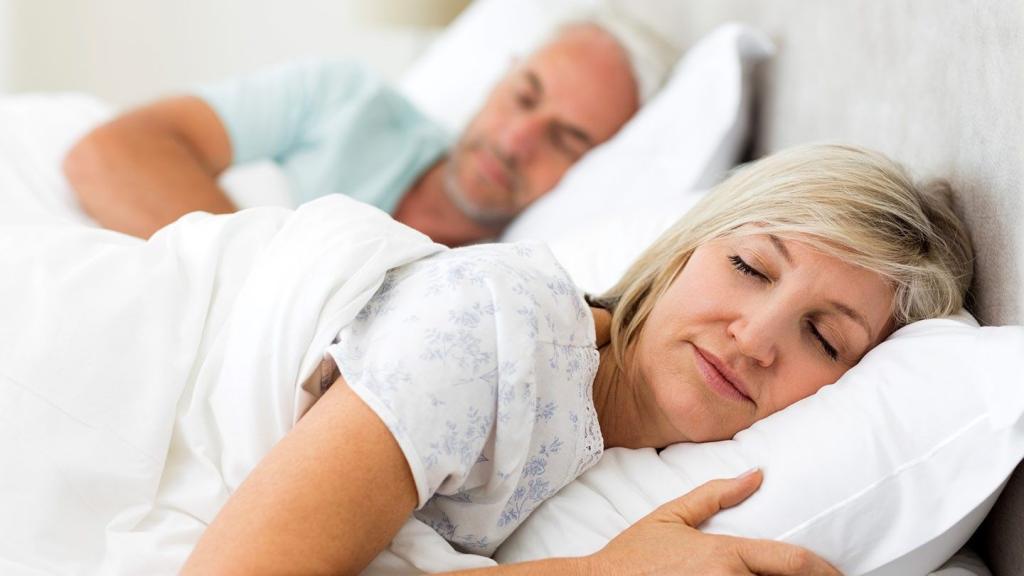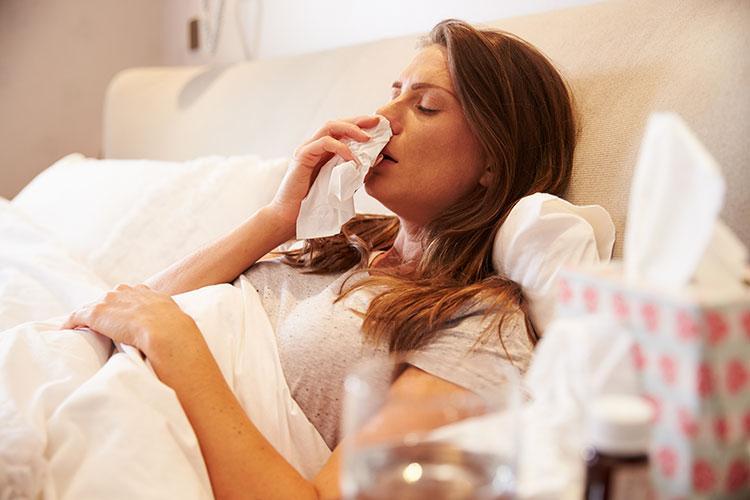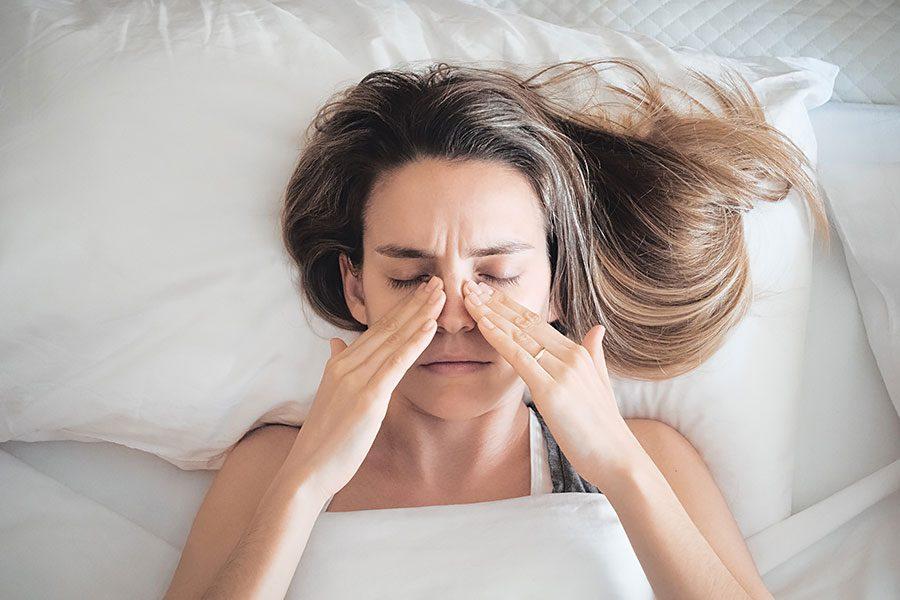This time of year can be so wonderful to see gardens blooming with beautiful gardenias and roses but it also marks the beginning of allergy season. About 20 million adults in the United States have been diagnosed with seasonal allergic rhinitis (hay fever), according to the Centers for Disease Control and Prevention. Other than plants, there are many other types of allergies!
Sneezing, itchy eyes, a runny or stuffed-up nose, and other symptoms can be caused by seasonal allergies. Allergic reactions might keep you up at night, making it difficult to get a good night’s sleep. Allergy symptoms can cause sleep problems, which are common. Sleep deprivation can contribute to a lack of energy during the day. Even yet, don’t give up hope for allergy sufferers; there are solutions out there! We’ll discuss the specifics of allergens, how allergies affect sleep quality, and how to manage the symptoms so you can sleep, live, and feel better.
Here are some ways to help you get the sleep you need to deal with allergies:
- Try an air purifier. Even if you don’t have allergies, using an air purifier at night has been found to improve your sleep.
- Keep doors and windows closed during pollen season. When pollen counts are high, some allergy sufferers benefit from having windows closed and using air conditioning at home and in their vehicles.
- Explore medication options with your doctor. A visit to the doctor is the best way to find out what kind of allergies you’re having and what kind of treatment plan is best for alleviating your symptoms.
Types of Allergies
Many factors, like what you’re allergic to, where you live, and the season, influence how allergies impact you. Seasonal allergies are a typical problem for some people. Allergies to pollens or mold spores are the most common cause of seasonal allergies in the United States during the spring, summer, and early fall. When it comes to seasonal allergies, dust mites may be to blame. Allergies to dust mites or cat dander are more common if they are chronic rather than seasonal. These things can make it difficult to get to sleep, or to stay asleep once you do.

How Do Allergies Affect Sleep?
Whenever an allergen enters your nose, it causes irritation of the nasal passages, resulting in symptoms such as stuffy nose, sneezing, and watery eyes. Allergies usually lead to poor sleep quality since they impair your ability to breathe easily and worsen at night.
Allergies might keep you awake at night, preventing you from getting the rest you need. When you don’t get enough sleep, the next day you’ll be weary and cranky4. Being sleepy can have a detrimental impact on your health and well-being at school and work. Anxiety and tension are exacerbated by lack of sleep, making it even more difficult to go off to sleep.
Allergies not only make it difficult to get to sleep, but they also make it difficult to stay asleep once you do. Allergy sufferers may wake up in the middle of the night with a stuffy nose, sneezing, or coughing. Because chronic sleep loss caused by allergies can become a vicious cycle, many people turn to sedatives or alcohol7 in an attempt to go to or remain asleep. This is a bad idea.
What Kind of Sleep Disturbances Can Come From Allergies?
When you have allergies, it is possible that they will have an impact on your sleep in every way imaginable. Asthma sufferers are substantially more likely8 to have sleep difficulties, such as:
- Insomnia.
- I’m having a hard time getting to sleep.
- A hard time sleeping at night.
- A rise in snoring.
- Sleep apnea is more likely to occur.
- Sleep deprivation is a problem.
- A short night’s rest.
Every day, they face new challenges. As a result, they’re more likely9 to wake up with a headache or sinus pain in the morning.
If a person’s allergies are particularly severe, they may also have difficulty sleeping. People with more severe allergic reactions have a harder time sleeping.
Allergy-related sleep problems can lead to more significant issues like bedwetting, sleep apnea (OSA), sleep apnea (snoring), and other sleep-related breathing problems. Concerns about the link between allergens and OSA are warranted because OSA can induce weight gain, high blood pressure, cardiovascular illness, and even death12.
Children with allergies are more likely to suffer from obstructive sleep apnea, according to pediatric studies. It is more than twice as common for children who suffer from sleep apnea to suffer from allergic rhinitis. For children, sleep deprivation can have a devastating effect, causing them to miss school days, behavioral issues, difficulties with memory and concentration, and a worsening of their sleep disorders. IQ 15x A Reliable Source Information on biotechnology from the National Library of Medicine The National Center for Biotechnology Information provides access to biological and genomic information to enhance science and health.pubmed.ncbi.nlm.nih.gov.
How Can You Sleep Better With Allergies?
Asthma and allergy sufferers may have difficulty sleeping, but it can be done. The following are seven suggestions for managing seasonal allergies and getting a better night’s sleep.
1. Use an Air Purifier.
Allergy sufferers and non-allergic people alike can benefit from using air purifiers16. Mold, dust mites, pet dander, and pollen are all common household allergens that can irritate your lungs.
2. Close Your Doors and Windows.
If you open your windows throughout the day, you’re allowing allergens to enter your house. However, closed windows and doors can go a long way in protecting your bedroom from allergies.
3. Keep Your Furniture as Dust-Free as Possible
Dust and grime can accumulate in the tiniest spaces, making it hard for many people to believe. You should avoid drapes with heavy fabric or upholstered furniture in your bedroom. If at all feasible, avoid floor-to-ceiling carpet. To minimize the accumulation of dust, use sheets and pillowcases made of tightly woven cloth. When decorating your bedroom, steer clear of “dust collectors,” including stuffed animals and imitation flowers, and old books.

4. Keep Pets Out of Your Bedroom.
You may find that sleeping in a separate room from your pet will help alleviate your allergy symptoms at night. Outside your bedroom, give them a cozy bed and pet them goodnight as you go to sleep. Keep in mind the importance of washing your hands afterward!
5. Change Up Your Laundry Routine.
You should remove your clothing when you return to the house, especially on days with high pollen counts, and place it in the laundry room. Hanging your things outside to dry is a bad idea, and you should never do it. If you can, use a dryer instead of a hairdryer.
6. Shower Before Bed.
Pollen can be washed away by taking a shower before going to sleep. Take a shower before going to sleep and you’ll always be fresh and ready to face the day.
7. Take Allergy Medication at Night.
Change your morning allergy medicine to a midnight one if it’s working for you now. Consult with your doctor beforehand, however. As a result, the drug will not wear off over the night, and you will be able to go to sleep with a strong dose.
8. Talk to Your Doctor.
Based on the type of allergies you’ve been diagnosed with, your doctor can help you find the best way to treat them. In addition to over-the-counter drugs and prescription medications, there are also lifestyle adjustments that can help alleviate the symptoms.
Reduce Pollen and Dander Exposure
Allergy sufferers can greatly benefit from a change in their diet and lifestyle. Keep windows closed and use air conditioning when pollen count is high to help allergy sufferers, for example. Allergies can be alleviated for some pet owners by allowing their animals to sleep in a separate room from their own. If this is the case, you may want to consider building a separate area in your home for your pet to sleep at night, rather than in your bedroom. To prevent pet hair and dander, keep pets out of the bedroom during the daytime. Be sure to wash your hands thoroughly after petting your fluffy friends to avoid transferring allergens and dander into your nose and eyes. While showering before bed helps remove any pollen or dander that you may have picked up, it can also make your bedtime ritual cleaner. For those who suffer from pet allergies, an air purifier may be a good investment.
Clean the Air for Better Sleep
Even if you don’t have allergies, using an air purifier at night has been found to improve your sleep. Allergies can be exacerbated by air pollution. Many people are allergic to dust mites, mold spores, and pet dander, among other things. In bedding, such as sheets, pillows, and mattresses, several allergens may be present. It’s possible for pollen to be found indoors and outside; some forms of pollen have a larger count at night than during the day. Using air purifiers in the bedroom might help ease allergy symptoms while you sleep.
A sort of sound known as pink noise is emitted by some air purifiers, such as the Alen BreatheSmart range, which can help people sleep better. Using the Alen BreatheSmart 45i, researchers at SleepScore Labs found that those who had trouble sleeping were able to sleep better. Research participants in the first study claimed that utilizing an Alen air purifier reduced their allergy symptoms by 96 percent, while 93% said it enhanced their sleep. A statistically significant difference was seen in the quality of participants’ sleep when they used an air purifier in their bedroom, compared to the nights when they didn’t use an air purifier.
Allergy cases are unique and require a variety of treatments and approaches. As a result, finding out what works best for you may necessitate some experimentation. While allergies can definitely affect your sleep, you can begin taking actions immediately to regulate your allergies and get the sleep that your body needs if you stay proactive and seek advice from your health care provider.

Allergies and sleep apnea: The CPAP connection
As a result, while considering allergies and sleep apnea, there is another element to consider: Allergic reactions might interfere with the CPAP therapy that is commonly used to treat sleep apnea. ) (What is CPAP?). Check it out.)
It’s possible to get around potential issues caused by the presence of both allergies and sleep apnea with the use of CPAP masks and other equipment. Full face masks are more helpful than nasal pillows masks if your allergies make breathing through your nose difficult, for example. You can breathe through your mouth and nose even if your nose is congested with a full face mask because it covers both areas.
People who suffer from both allergies and sleep apnea can benefit from enhanced CPAP technology in the form of APAP, or automated positive airway pressure. How? With allergies, your breathing can change during the night, and APAP is intended to give the right amount of air to keep up with those changes..
Talk to your doctor or sleep therapist if your allergies are interfering with your treatment for sleep apnea. They may recommend a different CPAP mask or a different type of PAP machine.

![Top Rated CPAP Machine Buyer’s Guide [current_date format=’m/Y’]](https://bestpillowsleepers.com/wp-content/uploads/2023/03/best-cpap-machine-img_6405d72310053-400x300.jpg)
![The 11 Best Cooling Weighted Blankets [current_date format=’m/Y’]](https://bestpillowsleepers.com/wp-content/uploads/2023/01/best-cooling-weighted-blankets-img_63d4ff15c615d-400x300.jpg)
![Ultimate Guide to Choosing a Best Cooling Mattress Pads [current_date format=’m/Y’]](https://bestpillowsleepers.com/wp-content/uploads/2023/01/best-cooling-mattress-pads-img_63c403115126b-400x300.jpg)
![Ultimate Guide to Choosing a Best Cooling Mattress [current_date format=’m/Y’]](https://bestpillowsleepers.com/wp-content/uploads/2023/01/ultimate-guide-to-choosing-a-best-cooling-mattress-img_63bcdba870d77-400x300.jpg)
![Ultimate Guide to Choosing a Best Cooling Comforters [current_date format=’m/Y’]](https://bestpillowsleepers.com/wp-content/uploads/2023/01/ultimate-guide-to-choosing-a-best-cooling-comforters-img_63bba2f5cd3ce-400x300.jpg)